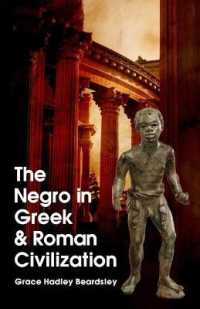- ホーム
- > 洋書
- > 英文書
- > Business / Economics
Full Description
Addressing a dearth of literature in this area, this book provides a comprehensive overview and framework of study of the politics of religious tourism. Existing work shows awareness that politics is present but the approach has been one of benign neglect, and/or a priori assumptions about the role of politics in the management of sacred sites. Previous literature is fragmented into various perspectives and approaches that best serve different disciplinary interests. By understanding the politics of religious tourism through the various perspectives and approaches from the discipline of political science, law, public policy, and other fields, this book: · Focuses on how power is exercised regarding religious tourism. · Looks at the governing institutions of religious tourism including the role of relevant governmental bodies such as ministries of tourism or national tourism boards, ministries of religion and/or culture. · Covers the role and influence of religious governing institutions, such as state-supported church/mosque officials, and universities. This book will be of great interest to researchers and students of religious tourism, pilgrimage, as well as related subjects such as political science, economics, sociology, tourism, law studies, and religious studies.
Contents
PART I: The Politics of Religious Tourism 1: Introduction to the Politics of Religious Tourism. Dino Bozonelos and Polyxeni Moira. 2: Religious and Faith Tourism and the Politicization of Sacred Sites. Daniel Olsen. 3: Human Rights: The right to tourism and access to religious tourism and pilgrimage sites. Dimitrios Mylonopoulos, Polyxeni Moira and Spyridon Parthenis. 4: Soft Power and Sacred Sites: The Geopolitics of Prayer. Dino Bozonelos. 5: Bringing the State Back into Religious Tourism: Institutional Logics and Religious Tourism Governance. Dino Bozonelos. PART II: Governance of Religious Tourism 6: Global Governance and Religious Tourism: The role of international organizations. Panagiota Manoli. 7: Blurring the Lines: Governance and Management in the Promotion of Religious and Spiritual Sites. Spyridon Parthenis, Polyxeni Moira and Dimitrios Mylonopoulos. 8: 'Ministries of Religion' in Western Democracies: Model of Fragmented Religious Tourism Governance. Dino Bozonelos, Elisa Piva and Stefania Cerutti. 9: The Multiple Scales in the Governance of the Way of Saint James. Xosé M. Santos and Jorge Olleros-Rodríguez. 10: Religious Tourism in Malta Between Politics, Policies and Private Enterprise. Dane Munro. PART III: Crisis, Politics and Sacred Sites 11: International Efforts to Secure Sacred Sites: Capacity and Autonomy Across Countries. Charlotte Lee, Masahiro Omae and Dino Bozonelos. 12: Closed of Sacred Sites and Autonomous Organization of Religious Ritual:: Re-thinking the Geography of Sacred Space. Policies and Restrictions in Europe in the Age of COVID-19. Valentina Castronuovo. 13: Is Pilgrimage an Essential Service? The Conflict over Congregational Worship and Health Governance. Maria Angélica Alvarez-Orozco and Silvia Aulet Serrallonga. 14: Religious Tourism as Economic Development Policy: The Politics of Tourism Development. Anna Trono. 15: Governing the Camino: Protecting Pilgrims during the COVID-19 Pandemic. Francisco Singul. 16: What's Next? Politics and Religious Tourism: Emerging and Future Directions. Dino Bozonelos and Polyxeni Moira.







